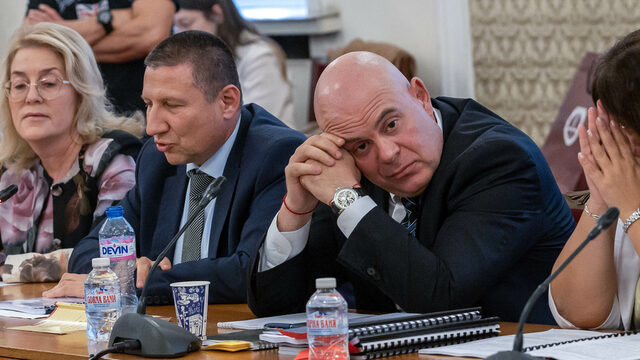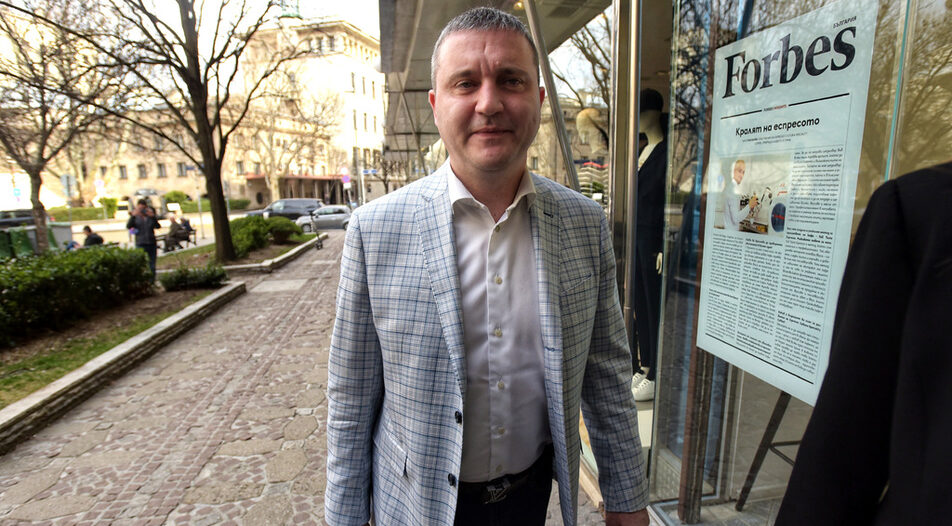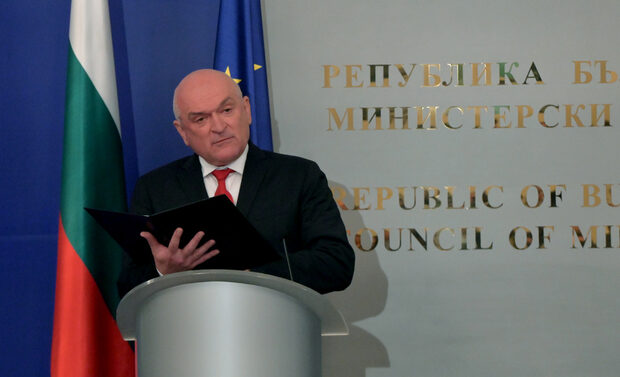Do you remember the Magnitsky Act sanctions imposed on several prominent Bulgarians in June 2021 over allegations of high-level corruption? The first batch provided quite a boom in Bulgaria, by singling out for the first time ever the MRF party member and secret mogul Delyan Peevski as a "significant agent of corruption". Together with him was his lieutenant and the exiled ex-lottery billionaire Vassil Bozhkov.
Maybe you've forgotten them because nothing much happened subsequently. Mr Peevski gave testimony a few times, only for the State Prosecution to close its case against him swiftly. Meanwhile, Mr Bozhkov's dozen cases remain on the back burner because the Prosecution claims it can't reach him in Dubai to even take his testimony.
Now, a brand new batch of names have been added to this infamous list. The US Treasury Department added five names, at least one of which is a huge blow not only for Mr Geshev, but also for the biggest party - GERB and its leader. The five new entries comprise two former ministers, two former MPs and a nuclear energy official.
Moreover, Washington is not acting alone in its anti-corruption efforts in Bulgaria - this time the UK added its own sanctions against the initial three Magnitsky Act persons. "Those sanctioned have deprived the people of Bulgaria of resources crucial to its economic and social development. Money that should have been used to fix roads, build hospitals and support economic growth has instead ended up in the pockets of corrupt individuals," UK Foreign Secretary James Cleverly was quoted as saying.
Out of 8 Europeans sanctioned by the Magnitsky act, seven are now Bulgarians. This is a strong message to the Bulgarian judiciary, the anti-corruption agency and the parties that have consistently undermined the long overdue reform of the magistrature. Its final effectiveness, however, remains an open question.
The additions to the list
On 10 February afternoon Bulgarian time, the Department of the US Treasury's Office of Foreign Assets Control (OFAC) announced it has sanctioned five current or former Bulgarian government officials - former energy minister Rumen Ovcharov (BSP), two ex-directors of Kozloduy Nuclear Power Plant - Aleksandar Nikolov and Ivan Genov (also an MP), pro-Russian politician and former BSP MP Nikolay Malinov, and ex-Finance Minister Vladislav Goranov (GERB) - for their "extensive involvement in corruption in Bulgaria".
"The US supports our NATO ally Bulgaria in its fight against both entrenched corruption and Russian influence, which undermine democratic institutions," Brian Nelson, Under Secretary of the Treasury for Terrorism and Financial Intelligence, was quoted saying. "The behavior exposed today spans political parties and administrations, highlighting the urgent need to dismantle the networks that have for years perpetuated illicit activities, especially in the energy sector. Corruption robs the Bulgarian people of hundreds of millions of dollars and hinders investment and economic growth in the country."
The first three people - Mr Ovcharov, Mr Nikolov and Mr Genov - were accused of corruptly benefiting from signing deals against the Bulgarian interest with Russian nuclear fuel (and in the case of Mr Ovcharov - gas) companies. The leader of the Russophile movement Nikolay Malinov - who was the first target of the war against Russian influence in Bulgaria, launched by the Prosecution four years ago - is the fourth person on the list, allegedly for bribing a judge to allow him to visit Russia while under investigation.
Lastly - but also most interestingly - is former Finance Minister Vladislav Goranov from GERB. He is described as close to Mr Peevski and is accused of "participating in a corruption scheme that resulted in tens of millions of euros paid to Bulgarian officials in exchange for favorable legislation for interested parties involved in the gambling industry." This is the same case against lottery mogul Vassil Bozhkov. Mr. Goranov is no longer holding any official position in GERB, after being dismissed from the Finance Ministry by Mr. Borissov himself in 2021, for "close relations with Peevski". Unofficially though, he is still very much in contact with the party, and his naming is a big blow for GERB before the elections.
First reactions
Initial reactions from all sides contained denial and excuses. The leader of GERB Boyko Borissov told activists in Stara Zagora that the party has dissociated itself from Goranov, as at the end of GERB's last term he resigned and has been excluded from the list for parliamentary elections ever since.

Deputy Prosecutor General and Director of the National Investigative Service Borislav Sarafov gave a press conference outlining the stages reached in each case. He justified the lack of prosecutorial action against Mr Goranov through citing the charges against businessman Vassil Bozhkov (who claims his business was extorted by Mr Borissov through Mr Goranov) and Mr Bozhkov's absence in Dubai, which apparently prevents him from being questioned.
Prosecution spokeswoman Siyka Mileva said on the prosecution's Facebook page that "as early as Monday, information will be requested from the State Anti-Corruption agency [among other security agencies] to provide whatever information is available to them about the sanctioned persons." But the answer will likely be the same as it was when the first Magnitsky list was announced. It transpired the Bulgarian secret services had no information about what they were sanctioned for.
Ex-Kozloduy CEO Ivan Genov dismissed the accusations on TV as did former Energy Minister Ovcharov, who also got support from his party BSP, which held a congress over the weekend. One of the Socialists politicians, Tasko Ermenkov, even speculated that US sanctions are a prelude to the forced closure of the Kozloduy NPP.
And while the President and the caretaker cabinet expressed bland appreciation for the support of Euro-Atlantic allies in Bulgaria's fight against corruption, the most damning comments came from Democratic Bulgaria. "Prosecutor General Ivan Geshev and the head of the investigation Borislav Sarafov should resign immediately because claiming that the list of those sanctioned under Magnitsky is growing thanks to the good work of the prosecutor's office is an insolence bordering on a mental issue," party co-chair Hristo Ivanov said on Sunday.
The message of the sanctions: reform judiciary now
Irrespective of excuses offered by the parties affected by the corruption charges, the new list fires broadsides at different groups. First, the ineffectual judiciary, which in two years has failed to sanction one corrupt politician or public official. Second, to parties that have targeted legislative changes designed to reform the Prosecution and investigate the Prosecutor General; And, lastly, to the public, which sees that previous sanctions have not been forgotten and that pressure will likely intensify.
The new sanctions could be interpreted as pressure to adopt legislative changes related to the Prosecution. A draft law, which creates a mechanism for controlling the Prosecutor General by allowing him to be investigated by a judge, was submitted by the Council of Ministers a few months ago. Instead of backing it, however, GERB, MRF and BSP supported at first reading in Parliament an alternative bill, which provides for the investigation to be carried out by an investigator who will be structurally subordinate to the Prosecutor General. This defeats the purpose. What is more, through the use of procedural tricks, the GERB MPs failed to adopt the bills in the second reading in the last days before Parliament was dissolved.
Apparently, Mr Borissov read this sign correctly, because he denounced his party's deputies' actions and tried to make them entirely to blame, even though it's hard to imagine how they could have decided this without his say-so: "Here is the big mistake of my MPs. They think they have outplayed WCC and Democratic Bulgaria. On the contrary, they outplayed us because we as a party have made a commitment to get judicial reform through. Because, believe me - I talk to important people in the USA quite often, they expected [the adoption of the anti-corruption bill of Justice Minister Krum Zarkov] to pass." His promise was to pass the law the first thing after the new elections.
So far, there have been no repercussions for those on the first Magnitsky list. The added names can be seen as an indictment of the work of the Prosecutor's office. They also underline that further failure to probe the corrupt in Bulgaria will only intensify US pressure on Sofia. British involvement and numerous references to the EU in the new announcement point to a concerted anti-corruption front outside Bulgaria that can't be dismissed lightly.
Do you remember the Magnitsky Act sanctions imposed on several prominent Bulgarians in June 2021 over allegations of high-level corruption? The first batch provided quite a boom in Bulgaria, by singling out for the first time ever the MRF party member and secret mogul Delyan Peevski as a "significant agent of corruption". Together with him was his lieutenant and the exiled ex-lottery billionaire Vassil Bozhkov.
Maybe you've forgotten them because nothing much happened subsequently. Mr Peevski gave testimony a few times, only for the State Prosecution to close its case against him swiftly. Meanwhile, Mr Bozhkov's dozen cases remain on the back burner because the Prosecution claims it can't reach him in Dubai to even take his testimony.












